 W
WThe Almedalen Week is an annual event taking place in week 27 in and around Almedalen, a park in the city of Visby on the Swedish island Gotland.
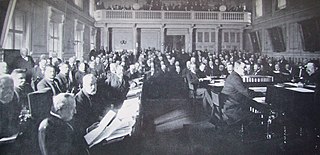 W
WThe Andra kammaren was the lower house of the bicameral Riksdag of Sweden between 1866 and 1970 that replaced the Riksdag of the Estates. The upper house was the Första kammaren.
 W
WThe Arctic Council is a high-level intergovernmental forum that addresses issues faced by the Arctic governments and the indigenous people of the Arctic. At present, eight countries exercise sovereignty over the lands within the Arctic Circle, and these constitute the member states of the council: Canada; Denmark; Finland; Iceland; Norway; Russia; Sweden; and the United States. Other countries or national groups can be admitted as observer states, while organizations representing the concerns of indigenous peoples can be admitted as indigenous permanent participants.
 W
WThe Arctic Economic Council (AEC) is an independent international business membership organisation representing companies that work with and within the Arctic. The AEC advocates sustainable economic development in the region and represents a business perspective on sustainability. The AEC is the only regional business organisation in the Arctic and has members from all eight Arctic states.
 W
WThe cabinet of Carl Bildt was the cabinet of Sweden from 4 October 1991 to 7 October 1994 with Carl Bildt as the Prime Minister. It was a coalition government between the Moderate Party, the Centre Party, the Liberal People's Party and the Christian Democrats.
 W
WThe cabinet of Fredrik Reinfeldt was the cabinet of Sweden from 2006 to 2014. It was a coalition cabinet consisting of the four parties in the centre-right Alliance for Sweden: the Moderate Party, Centre Party, Liberal People's Party and the Christian Democrats.
 W
WGöran Persson served as Prime Minister of Sweden between 22 March 1996 and 6 October 2006. Persson took over after Ingvar Carlsson, who retired as party leader and Prime Minister. Following the 2006 general election, he and the Persson Cabinet lost power to a centre-right coalition government.
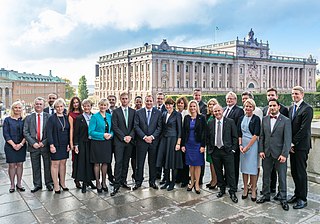 W
WThe first cabinet of Stefan Löfven was the cabinet of Sweden between 2014 and 2018. It was a coalition government, consisting of two parties: the Social Democrats and the Green Party. The cabinet was installed on 3 October 2014, following the 2014 general election. It lost a vote of no confidence following the 2018 election, but remained in office as a caretaker government. Löfven was reelected as Prime Minister in January 2019, thus forming the second cabinet of Stefan Löfven.
 W
WThe second cabinet of Stefan Löfven was the Government of Sweden from 21 January 2019 to 9 July 2021. It was a coalition, consisting of two parties: the Social Democrats and the Green Party. The cabinet was installed on 21 January 2019, following the 2018 general election.
 W
WThe third cabinet of Stefan Löfven is the present Government of Sweden. It is a coalition, consisting of two parties: the Social Democrats and the Green Party. The cabinet was installed on 9 July 2021, during a formal government meeting with King Carl XVI Gustaf. The government is the result of the aftermath of the 2021 government crisis, which saw Löfven's government removed from power in a vote of no-confidence over proposed reforms to liberalize the rent control system.
 W
WCorruption in Sweden has been defined as "the abuse of power" by Swedish National Council for Crime Prevention (Brå). By receiving bribes, bribe takers abuse their position of power, which is consistent with how the National Anti-Corruption Unit of the Swedish Prosecution Authority specifies the term. Although bribes and improper rewards are central in the definition of corruption in Sweden, corruption in the sense of "abuse of power" can also manifest itself in other crimes such as misuse of office, embezzlement, fraud and breach of trust against a principal.
 W
WThe Swedish constitution allows the Prime Minister to appoint one of the Ministers in the cabinet as deputy prime minister, in case the Prime Minister for some reason is prevented from performing his or her duties. If a Deputy Prime Minister has not been appointed, the Minister in the cabinet who has served the longest time takes over as head of government.
 W
WThe cabinet of Nils Edén was the cabinet of Sweden between 19 October 1917 and 10 March 1920. The cabinet was a coalition government consisting of ministers from the Liberal Coalition Party and the Social Democratic Party, with the Liberal Coalition Party's Nils Edén as Prime Minister. The cabinet succeeded the conservative Swartz cabinet and was succeeded by the social democratic Branting I cabinet.
 W
WThe Första kammaren was the upper house of the bicameral Riksdag of Sweden between 1866 and 1970 that replaced the Riksdag of the Estates. During the bicameral period, the lower house of the Riksdag was the Andra kammaren. Both chambers had generally similar and parallel powers.
 W
WThe Housemaid Debate or Maid Debate is a political discussion in Sweden, which begun on 18 July 1993 when Swedish economist Anne-Marie Pålsson proposed tax deductions for household services.
 W
WThis is a list of spouses of the prime minister of Sweden.
 W
WIn 2005 the government of Sweden appointed a commission to draw up a comprehensive programme to reduce Sweden's dependence on petroleum, natural gas and other ‘fossil raw materials’ by 2020. In June 2006 the commission issued its report, entitled Making Sweden an Oil-Free Society. The report cited four reasons to reduce oil dependence:The impact of oil prices on Swedish economic growth and employment The link between oil, peace and security throughout the world The great potential to use Sweden's own clean renewable energy resources in place of oil The threat of climate change resulting from the extensive burning of fossil fuels
 W
WElma Danielsson née Sundquist, was a Swedish journalist and politician. She was a journalist and temporary editor of the social democratic paper Arbetet from 1887 onward, and has been referred to as the first woman in the social democratic press.
 W
WThe National Defence Radio Establishment is a Swedish government agency organised under the Ministry of Defence. The two main tasks of FRA are signals intelligence (SIGINT), and support to government authorities and state-owned companies regarding computer security.
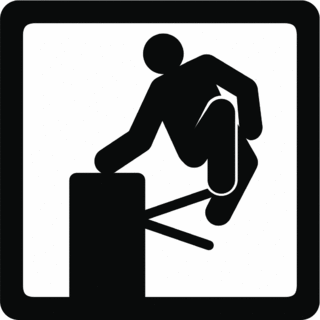 W
WPlanka.nu is a network of organizations in Sweden promoting tax-financed zero-fare public transport with chapters in Stockholm, Gothenburg, Skåne and Östergötland. Planka.nu was founded in 2001 by the Swedish Anarcho-syndicalist Youth Federation in response to the increasingly expensive ticket prices in the public transport system in Stockholm. The campaign has received much attention because of the controversial methods used to promote free public transport: Planka.nu encourage people to fare-dodge in the public transport, aiding its members in paying penalty fares through the insurance fund p-kassan.
 W
WScania, also known by its native name of Skåne, is the southernmost of the historical provinces (landskap) of Sweden. The former province is roughly conterminous with Skåne County, created in 1997. Like the other former provinces of Sweden, Scania still features in colloquial speech and in cultural references, and can therefore not be regarded as an archaic concept. Within Scania there are 33 municipalities that are autonomous within the Skåne Regional Council. Scania's largest city, Malmö, is the third-largest city in Sweden, as well as the fifth-largest in Scandinavia.
 W
WThe refugee controversy in Sjöbo, Sweden are the surrounding events of the 1988 referendum that banned Sjöbo Municipality from admitting foreign refugees. In 1987, despite opposition and demonstrations, local Centre Party politician Sven-Olle Olsson (1929–2005), who was Sjöbo's municipal commissioner at the time, was successful in gaining the support of the Sjöbo municipal assembly to hold a referendum to decide if Sjöbo should ban the acceptance of foreign refugees. The controversial referendum passed with a 67.4% majority for the ban in 1988, gaining Olsson and Sjöbo much publicity in the Swedish media. The outcome was heavily criticized by Swedish media and politicians.
 W
WRepublicanism in Sweden is the collective term for the movement in Sweden that seeks to establish a republic and abolish the Swedish constitutional monarchy.
 W
WThe Riksakten was the 1815 Act of Union that regulated the terms of the constitutional personal union between Sweden and Norway established in 1814. The fundamental documents of the union were only the Convention of Moss and the revised Norwegian constitution of 4 November 1814. The Norwegian constitution had been adapted to the union before it was entered into, but the Swedish one was never adjusted correspondingly. The conservative Swedish Riksdag had not allowed the Swedish constitution of 1809 to be revised. Therefore, a bilateral treaty had to be negotiated in order to clarify procedures for treating constitutional questions that had to be decided jointly by both governments.
 W
WThe Riksdag is the national legislature and the supreme decision-making body of Sweden. Since 1971, the Riksdag has been a unicameral legislature with 349 members, elected proportionally and serving, from 1994 onwards, on fixed four-year terms.
 W
WThe Saltsjöbaden Agreement is a Swedish labour market treaty signed between the Swedish Trade Union Confederation and the Swedish Employers Association on 20 December 1938, that became a model for other agreements. The rules on industrial action have come to be regarded almost as general legal principles of conflicts between the labor market forces. The agreement cemented the Swedish social norm that the two sides shall conclude agreements without interference by government. The agreement is still in effect, with the latest changes being made in 1976.
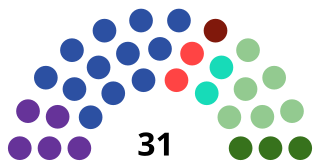 W
WThe Sámi Parliament of Sweden is the representative body for people of Sámi heritage in Sweden based in Kiruna. It acts as an institution of cultural autonomy for the indigenous Sámi people.
 W
WSmoking in Sweden is at a very low prevalence; only 11% of the total Swedish population smoked daily in 2016. Around another 10% smoke occasionally. Smoking has been banned in all bars and restaurants since May 2005. A majority of Swedes supported the introduction of the ban. Sweden was the only European country to achieve the WHO goal of less than 20% daily smoking prevalence among adults by year 2000. Sweden has a high level of use of smokeless tobacco, specifically a moist snuff product called 'snus', which some Swedes have used as a replacement for smoking.
 W
WAnarchism was reported to have been extant in Sweden by Mikhail Bakunin as early as 1866. As with the movements in Germany and the Netherlands, Swedish anarchism had a strong syndicalist tendency. One of the earliest Swedish anarchists of note was the artist Ivan Aguéli who in 1884 was arrested and sentenced in the "Trial of the thirty" in Paris. Also prominent were Anton Nilson, Leon Larsson, Axel Holmström, Albert Jensen, and Hinke Bergegren. Bergegren edited and published nine issues of the weekly periodical Under röd flagg, from March to June 1891. The magazine, which had an anarchist communist editorial bent, featured excerpts from the writings of prominent European anarchist intellectuals Peter Kropotkin, Leo Tolstoy, and Élisée Reclus.
 W
WThe Swedish Anarcho-Syndicalist Youth Federation, (SUF) is a youth-based group in Sweden that supports independent working class struggle.
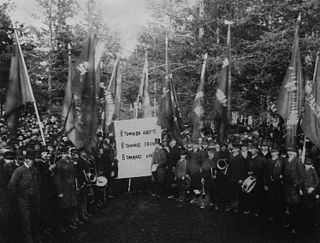 W
WThe labour movement in Sweden dates back to at least the 1850s, when Swedish workers initiated the organizing of previously spontaneous food riots into strikes, hence acting as an autonomous group.